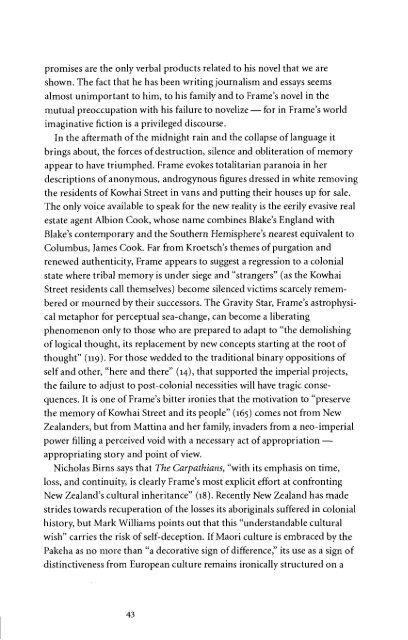The Carpathians - University of British Columbia
The Carpathians - University of British Columbia
The Carpathians - University of British Columbia
Create successful ePaper yourself
Turn your PDF publications into a flip-book with our unique Google optimized e-Paper software.
promises are the only verbal products related to his novel that we are<br />
shown. <strong>The</strong> fact that he has been writing journalism and essays seems<br />
almost unimportant to him, to his family and to Frame's novel in the<br />
mutual preoccupation with his failure to novelize — for in Frame's world<br />
imaginative fiction is a privileged discourse.<br />
In the aftermath <strong>of</strong> the midnight rain and the collapse <strong>of</strong> language it<br />
brings about, the forces <strong>of</strong> destruction, silence and obliteration <strong>of</strong> memory<br />
appear to have triumphed. Frame evokes totalitarian paranoia in her<br />
descriptions <strong>of</strong> anonymous, androgynous figures dressed in white removing<br />
the residents <strong>of</strong> Kowhai Street in vans and putting their houses up for sale.<br />
<strong>The</strong> only voice available to speak for the new reality is the eerily evasive real<br />
estate agent Albion Cook, whose name combines Blake's England with<br />
Blake's contemporary and the Southern Hemisphere's nearest equivalent to<br />
Columbus, James Cook. Far from Kroetsch's themes <strong>of</strong> purgation and<br />
renewed authenticity, Frame appears to suggest a regression to a colonial<br />
state where tribal memory is under siege and "strangers" (as the Kowhai<br />
Street residents call themselves) become silenced victims scarcely remembered<br />
or mourned by their successors. <strong>The</strong> Gravity Star, Frame's astrophysical<br />
metaphor for perceptual sea-change, can become a liberating<br />
phenomenon only to those who are prepared to adapt to "the demolishing<br />
<strong>of</strong> logical thought, its replacement by new concepts starting at the root <strong>of</strong><br />
thought" (119). For those wedded to the traditional binary oppositions <strong>of</strong><br />
self and other, "here and there" (14), that supported the imperial projects,<br />
the failure to adjust to post-colonial necessities will have tragic consequences.<br />
It is one <strong>of</strong> Frame's bitter ironies that the motivation to "preserve<br />
the memory <strong>of</strong> Kowhai Street and its people" (165) comes not from New<br />
Zealanders, but from Mattina and her family, invaders from a neo-imperial<br />
power filling a perceived void with a necessary act <strong>of</strong> appropriation —<br />
appropriating story and point <strong>of</strong> view.<br />
Nicholas Birns says that <strong>The</strong> <strong>Carpathians</strong>, "with its emphasis on time,<br />
loss, and continuity, is clearly Frame's most explicit effort at confronting<br />
New Zealand's cultural inheritance" (18). Recently New Zealand has made<br />
strides towards recuperation <strong>of</strong> the losses its aboriginals suffered in colonial<br />
history, but Mark Williams points out that this "understandable cultural<br />
wish" carries the risk <strong>of</strong> self-deception. If Maori culture is embraced by the<br />
Pakeha as no more than "a decorative sign <strong>of</strong> difference," its use as a sign <strong>of</strong><br />
distinctiveness from European culture remains ironically structured on a

















